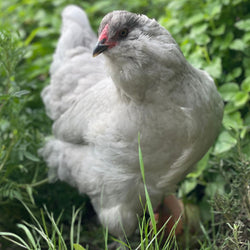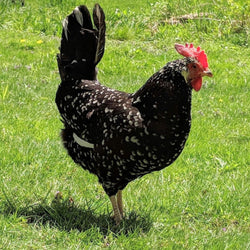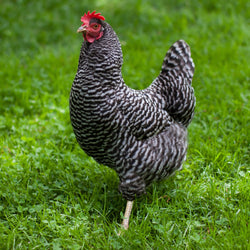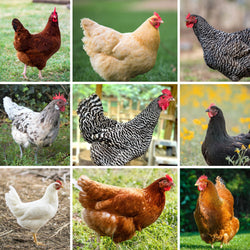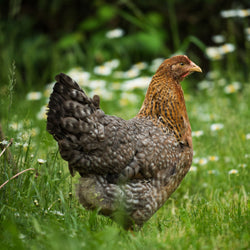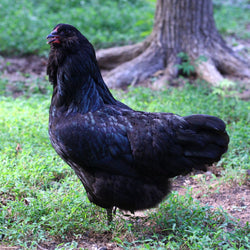f=menu&page=9/--
Frequently Asked Questions
Here we answer the most commonly-asked questions about ordering, chicken care, and more.
How do I find a new home for a rooster I don't want?
Unfortunately, as you've learned, sexing is more of an art than an exact science, so when you buy day-old chicks, there's always a small risk of receiving a mis-sexed bird. We're sorry if this has happened to you, whether you purchased your chicks from us or from another hatchery or feed store. It can be stressful to try to find a home for your unwanted rooster, and sometimes the most stressful part is having to part with him at all. Juvenile roosters are usually very friendly, and almost invariably are the favorite "hen" of the flock, so the disappointment can...
Read MoreHow do blue eggs become blue (instead of white or brown)?
Whereas the brown color of an egg is laid on the outside of the shell, the blue color actually goes all the way through the shell, even to the inside of the shell. Originally, it was thought that color pigments were synthesized in the blood by the breakdown of hemoglobin, but research shows it is more likely that they are actually synthesized in the shell gland pouch. The blue color is produced by biliverdin; the brown color is produced by protoporphyrin, and they are incorporated into the shell in different ways based on their different compositions. Again, to make it...
Read MoreHow much feed should I give my chickens each day?
We recommend feeding "free choice"; that is, letting them eat as much layer feed as they want and leaving their feeder out at all times (although you may take it up at night if you like). Even if your chickens have access to pasture, free ranging simply supplements their diet. Chickens will eat as much food as they need to keep themselves healthy. Some breeds may be able to barely subsist in good weather by free ranging (although this is unlikely, as chickens are domesticated animals, not wild animals), but most will simply starve if you don't provide them enough...
Read MoreCan I mix different breeds of chicken in my flock--will they all get along?
Yes, in most cases you can mix breeds of chickens in your flock. They generally get on very well. You can even include both bantam and large fowl breeds in your flock, if that is what you prefer. In fact, bantams don't always or even usually end up on the lower end of the pecking order just because they're smaller. Pro Tip: When mixing different bird sizes, you will simply need to make certain that you have your feeders and waterers set at a height so that all your chickens can easily reach them. Problems can occur "mixing" breeds in...
Read MoreMy chickens run away whenever they see me. Can I tame them?
In general, chickens can be tamable and friendly by the same sorts of general methods you would use with a dog or a cat. Presuming they are healthy and receiving proper shelter, food and water--as well as nesting places--they will often be tempted by treats (given in moderation) of wild bird seed, meal worms, sunflower seed and so forth. If they learn to associate you with good treats, they will probably come running to you when they hear you, rather than in the other direction. Keep in mind that chickens do not usually like the same kind of handling a dog...
Read MoreMy chickens are 7 months old and I still haven't seen an egg. Why?
First, you should make sure they are on a good chicken feed. Once they have begun laying, switch to layer pellet or crumble; until then, feed them starter or grower. Some people make the mistake of feeding "scratch" only, when scratch is just meant to be a treat. Scratch in particular is mostly corn, which has very little nutritional value to it, and is low in protein. Feeding them scratch only would be like feeding your kids potato chips and corn chips only: it would simply not be very healthy! Second, some breeds do not come into lay until later...
Read MoreHow do I transition my juvenile chicks to their outdoor coop when it's cold outside?
There is no perfect age to transition your chicks to their outdoor coop, but generally by the time they are 4 to 6 weeks old, they're getting large for an indoor brooder and will want more space. Plus, they will be mostly feathered and able to maintain their body temperatures on their own. But just because you've adjusted the heat gradually down to the ambient temperature of your home doesn't mean they can go from 68 F inside to 15 F outside in the dead of winter! Sudden temperature changes are a real danger to your birds. You'll need to...
Read MoreThere is a black spot on my chicken's face! Should I be worried?
When a chicken gets a peck or a scrape on a comb or face, this will manifest as a black spot or scab, and isn't usually a cause for concern. If ALL of your chickens seem to have spots, if they are yellow or pussy, or if you are sure the spots you see are not from a scrape or peck, it might be a different problem. One possibility is that your chickens have Fowl Pox (dry) or Fowl Pox (wet). There are a few different things that can cause lesions, however, and if you have any concern, we recommend you take...
Read More







"The Clubhouse" Coop
Easy to assemble and built to last, the Clubhouse Coop is the perfect starter coop for a small flock.

